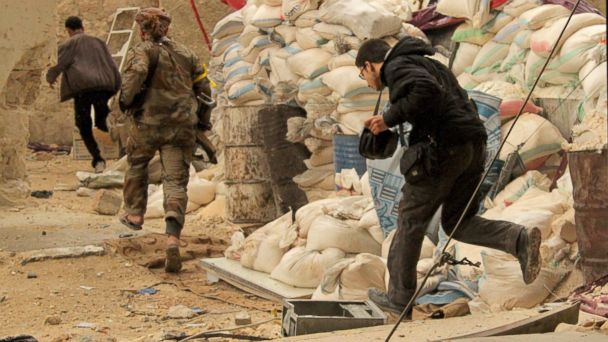Bashar al-Assad's Deadly Loophole in Syria Deal

Free Syrian Army fighters run in Aleppo, Syria, April 18, 2014. Salih Mahmud Leyla/Anadolu Agency/Getty Images.
The Obama administration's top accomplishment on Syria - a deal in which President Bashar al-Assad would surrender his chemical weapons - risks being undermined by substantial, potentially deadly loopholes in the agreement.
Secretary of State John Kerry touted on Tuesday the fact that Syria had given up almost all its declared chemical weapons and would finish the process by the end-of-April deadline.
"We now have the majority percentage of chemical weapons moved out of Syria, and we're moving on schedule to try to complete that task," he said at a State Department event.
But events in Syria paint a more complicated picture of Assad's continued ability to kill civilians with chemical weapons.
Earlier this month, the Assad regime allegedly used chlorine gas - a weapon Syria is not required to relinquish - against civilians in the town of Kafr Zita, causing victims to suffocate, choke, vomit, foam at the mouth and develop hypertension, according to a letter from the head of the Syrian Coalition, a Western-approved opposition group, to the United Nations Security Council.
In the letter, Syrian Coalition representative Najib Ghadbian urged investigators from the joint mission between the U.N. and the Organization for the Prohibition of Chemical Weapons (OPCW) to inspect a research center in Damascus that allegedly produces Syria's chlorine gas.
The U.S. State Department said earlier this week that it has "indications of the use of a toxic industrial chemical, probably chlorine" in Kafr Zita. "We're examining allegations that the government was responsible."
The Assad regime has not responded to the allegations and ABC News calls to Syria's Mission to the U.N. were not returned.
State Department spokeswoman Jen Psaki said Tuesday that "there are remaining concerns about the brutality of the Assad regime," but she defended the deal that has stripped the Syrian government of much of its chemical arsenal.
"The point is here is that we've removed 86 percent of the most harmful chemicals. That still is a positive step," Psaki said.
Ghadbian noted that the use of chemical weapons does violate a second provision of the deal Syria agreed to in the fall, U.N. Security Council Resolution 2118: it had to sign on to what's known as the Chemical Weapons Convention, which prohibits the "development, production, acquisition, stockpiling, retention, transfer or use of chemical weapons."
Should such a U.N./OPCW investigation find that Syria did use chlorine gas on civilians, the U.N. Security Council would have authority under Chapter 7 of its charter to punish the regime.
But so far, said Oubai Shahbandar, spokesman for the Syrian Coalition, the Security Council hasn't discussed inspecting production sites or punishing for the regime for its alleged use of chlorine weapons.
Any Security Council decision would also have to get the approval of Russia, a permanent member and ally of Syria. Because that's unlikely to happen, Shahbandar said, the onus falls on the United States to hold the regime accountable.
"Assad continues to press his luck because he believes he can get away with it," Shahbandar said. "It is now time that he does not."
The United States acknowledged that confirming beyond doubt that the regime used chlorine gas would be difficult.
"The time required to conduct any investigation of alleged CW use would be dependent on the circumstances surrounding the investigation, not least of all the cooperation of the host country," State Department spokesperson Jen Psaki said Tuesday.
Meanwhile, Assad can continue to inflict chlorine gas attacks on civilians, knowing that the hands of the international community, especially the United States, are tied, said Andrew Tabler, a senior fellow at the Washington Institute for Near East Policy.
"I think [his actions] are based on a calculation that Obama just doesn't want to do anything," Tabler said.
The deal agreed to in the fall, which President Obama touted at the time as a diplomatic way to avoid airstrikes on Syria, also omits the destruction of Syria's 12 production and storage facilities where Syria might be hiding additional chemical weapons that it simply did not declare to the OPCW, Tabler states.
Critics of the administration's approach towards Syria have urged the United Nations to expand its mandate to include facility destruction, but there's little chance that would happen either, given Russia's veto power.
The more likely scenario, Tabler said, is that the April deadline for Syria to give up its chemical weapons will come and go, but the regime's killings of civilians with chemical weapons will continue.
"In the course of one week we're going to find that the regime is not complying. It's good to get all of those chemical weapons out of there, but the regime is doing it in such a way that it's not solving the problem, it's just tightening the grip on power," Tabler said.